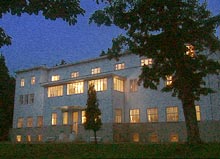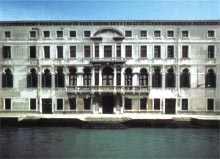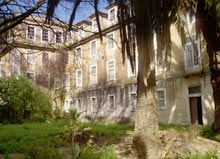| |

|
 |
|
|
Entstehung von "Alma"
|
|
 |
 |
Sanatorium Purkersdorf,
Wien |
|
1996 kam bei den Wiener Festwochen ein Simultandrama des
israelischen Dramatikers Joshua Sobol zur Aufführung,
das das Leben Alma Mahler-Werfels, der berühmtesten Küstlermuse
des Jahrhunderts, zum Thema hatte:
Alma– A Show Biz ans Ende
Das Sanatorium Purkersdorf, 1902 von Josef Hoffmann erbaut,
bot den idealen Spielort für das Modell eines "Polydramas",
bei dem die verschiedenen Handlungsstränge in Almas Leben
simultan in allen Räumen des Gebäudes stattfanden.
Der Zuschauer wählte zwischen den Spielorten und Darstellern
und stellte sich so seine ganz persönliche Dramaturgie
zusammen.
Der Erfolg war enorm, das Publikum stürmte das zum Stadtgespräch
gewordene Ereignis, die neue Spielform wurde von Kritik und
Publikum mit Begeisterung aufgenommen, der deutsche Spiegel
sprach vom "neuen Kultstück".
|
 |
 |
Palazzo Zenobio,
Venedig |
|
Alma á
Venezia
Mit dem Umbau des Sanatorium Purkersdorf war die Produktion
nach 6 Jahren heimatlos geworden, 2002 wurde aber ein spektakulärer,
neuer Spielort gefunden, an dem das Polydrama "Alma"
weiter bestehen konnte: Venedig. Im Palazzo Zenobio der armenischen
Kirche konnte "Alma á Venezia" im August
und September 2002 Kulturbegeisterte aus aller Welt anlocken
und Alma und ihr Leben spektakulär ins Licht der internationalen
Öffentlichkeit rücken.
|
|
 |
 |
Convento dos Inglesinhos,
Lissabon |
|
Alma in Lisbon
In the summer of 2003, the production went to Lisbon, where
Alma spent challenging and decisive months of her life. The
Werfels flew Vienna in 1938 for France when Austria fell to
the German army. In 1940, the Werfels along with Heinrich
Mann and his nephew Golo Mann flew by foot over the rugged
Pyrenees to Spain, ultimately leaving Europe for the United
States on board the Nea Hellas, the last regular ship from
Lisbon. Lisbon meant rescue for them. "There's no country
which helped as many refugees as Portugal in those days."
The small country became a transition for many well-known
refugees such as Heinrich Mann, Lion Feuchtwanger and Franz
Werfel.
An important part in the Portuguese version was given to
Consul-General Aristides de Sousa Mendes who was in charge
of the Portuguese Consulate in Bordeaux, in 1940. When history
catapulted him overnight to the position of custodian of human
lives hanging in the balance, he proved that he was far more.
He issued transit visas for entry into Portugal to an astounding
30.000 refugees, and opened up a refugee escape route where
none had existed. He rebelled against service orders and used
his office to overturn them, on behalf of humanity.
In her autobiography, Alma wrote: "I can never forget
those days of paradisiacal peace in a paradisiacal country,
after the torment of the previous months!" She is said
to have held court there like a fallen queen. And indeed this
is what she was: the queen among artists' muses. Lisbon was
a stage as if designed to tell of love and death and the depths
of desire, to tell the story of the last femme fatale
to whom this evening of theatre is dedicated: Alma Mahler-Werfel.
Archive
Wien 1996 – 2001
Venedig
2002
Lissabon
2003
|
|
